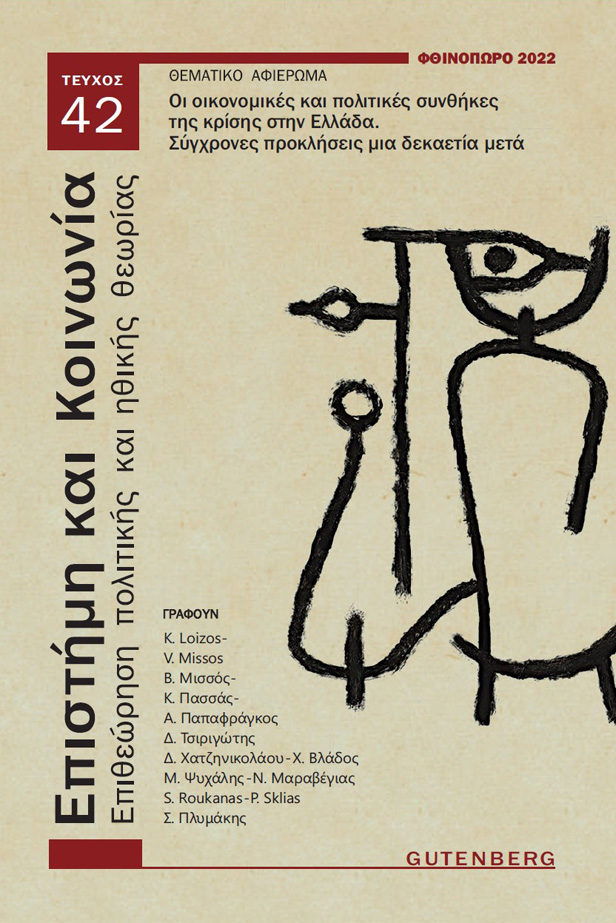Από το κράτος του δήμου στο πελατειακό κράτος. Μια πολιτική ερμηνεία του ελληνικού ζητήματος κατά την περίοδο της οικονομικής κρίσης, 2010-2020
Περίληψη
Σύνοψη: Αντικειμενικός σκοπός της παρούσας μελέτης είναι η ανάλυση-ερμηνεία των κοινωνικοπολιτικών αιτίων της Ελληνικής πολιτικό-οικονομικής κρίσης κατά την περίοδο 2010-2020. Αφορμώμενοι από τις αφετηριακές αρχές της συγκρότησης του Ελληνικού κράτους θα καταδείξουμε την αξονική αιτία της πολιτικής-πολιτειακής δυσμορφίας και λειτουργικής του ανεπάρκειας. Η εν λόγω αιτία συνίσταται στην κατάλυση της θεμελιακής ιδιοσυστασίας του ελληνισμού, δηλαδή της οργάνωσης των πολιτών σε δήμο που αυτοκυβερνάται, με απότοκο την ιδιοποίηση της πολιτικής εξουσίας/κράτους από τις πολιτικές δυνάμεις/κόμματα. Ως εκ τούτου οι μακροχρόνιες διαθρωτικές αδυναμίες της Ελλάδας, όπως η έλλειψη οικονομικής ανταγωνιστικότητας και η δημοσιονομική κακοδιαχείριση, δεν συνιστούν τις γενεσιουργές αιτίες της συγκαιρινής κρίσης, αλλά τα αιτιατά του τρόπου οργάνωσης-λειτουργίας του Ελληνικού κράτους.
Συναφώς η κεντρική υπόθεση εργασίας συνιστάται στο εάν και σε ποιο βαθμό η εγκαθίδρυση πελατειακών δικτύων από τα κόμματα που μονοπωλούν την εξουσία, αποτελεί τη μείζονα στρατηγική τους για την ανάρρηση τους στον κυβερνητικό θώκο δημιουργώντας κομματικούς «στρατούς» και συντελεί στην αδυναμία εκπλήρωσης των στοιχειωδών αναγκών της κοινωνίας.
Abstract: The aim of this study is to analyze and interpret the socio-political causes of the Greek political-economic crisis in the period 2010-2020. Starting from the initial principles of Greek state formation, we will demonstrate the main cause of the deformation of the political state and its functional inadequacy. This cause consists in the overthrow of the fundamental nature of Hellenism, i.e. the organization of citizens in a community that governs itself, resulting in the appropriation of political power/state by political parties. Therefore, the long-term structural weaknesses of Greece, such as the lack of economic competitiveness and fiscal mismanagement, are not the causes of the current crisis, but the causes of the organization of the Greek state. The establishment of client networks by the parties that monopolize political power is their main strategy for rising to power by creating party "armies", and contributes to the failure to meet the basic needs of society.
Λεπτομέρειες άρθρου
- Πώς να δημιουργήσετε Αναφορές
-
Tsirigotis, D. (2022). Από το κράτος του δήμου στο πελατειακό κράτος. Μια πολιτική ερμηνεία του ελληνικού ζητήματος κατά την περίοδο της οικονομικής κρίσης, 2010-2020. Επιστήμη και Κοινωνία: Επιθεώρηση Πολιτικής και Ηθικής Θεωρίας, 42, 90–118. ανακτήθηκε από https://ejournals.epublishing.ekt.gr/index.php/sas/article/view/29495
- Ενότητα
- Άρθρα

Αυτή η εργασία είναι αδειοδοτημένη υπό το CC Αναφορά Δημιουργού – Μη Εμπορική Χρήση – Παρόμοια Διανομή 4.0.
Οι Συγγραφείς που δημοσιεύουν εργασίες τους σε αυτό το περιοδικό συμφωνούν στους παρακάτω όρους:- Οι Συγγραφείς διατηρούν τα Πνευματικά Δικαιώματα και χορηγούν στο περιοδικό το δικαίωμα της πρώτης δημοσίευσης ενώ ταυτόχρονα τα πνευματικά δικαιώματα της εργασίας προστατεύονται σύμφωνα με την άδεια Creative Commons Αναφορά Δημιουργού - Μη Εμπορική Χρήση - Παρόμοια Διανομή 4.0 Διεθνές , που επιτρέπει σε τρίτους - αποδέκτες της άδειας να χρησιμοποιούν την εργασία όχι για εμπορικούς σκοπούς, με την προϋπόθεση της διατήρησης των διατυπώσεων που προβλέπονται στην άδεια σχετικά με την αναφορά στον αρχικό δημιουργό και την αρχική δημοσίευση σε αυτό το περιοδικό και με διανομή τυχόν τροποποιήσεων υπό την ίδια άδεια όπως και το πρωτότυπο.
- Οι Συγγραφείς μπορούν να συνάπτουν ξεχωριστές, και πρόσθετες συμβάσεις και συμφωνίες για την μη αποκλειστική διανομή της εργασίας όπως δημοσιεύτηκε στο περιοδικό αυτό (π.χ. κατάθεση σε ένα ακαδημαϊκό καταθετήριο ή δημοσίευση σε ένα βιβλίο), με την προϋπόθεση της αναγνώρισης και την αναφοράς της πρώτης δημοσίευσης σε αυτό το περιοδικό.
- Το περιοδικό επιτρέπει και ενθαρρύνει τους Συγγραφείς να καταθέτουν τις εργασίες τους μέσω διαδικτύου (π.χ. σε ένα ακαδημαϊκό καταθετήριο ή στους προσωπικές τους ιστοσελίδες) πριν και μετά από τις διαδικασίες της δημοσίευσης, καθώς αυτό μπορεί να οδηγήσει σε παραγωγική ανταλλαγή ιδεών και σκέψεων καθώς επίσης και σε γρηγορότερη και μεγαλύτερη χρήση και ευρετηρίαση της δημοσιευμένης εργασίας (See The Effect of Open Access).



